Wiedza dla biznesu
Konsultanci instytutu publikują swoje doświadczenia w rozmaitych książkach i czasopismach naukowych. Dla zainteresowanych publikacje są dostępne m.in. w Google Scholar.
Zapraszamy do lektury.
Zobacz publikacje naszych ekspertów
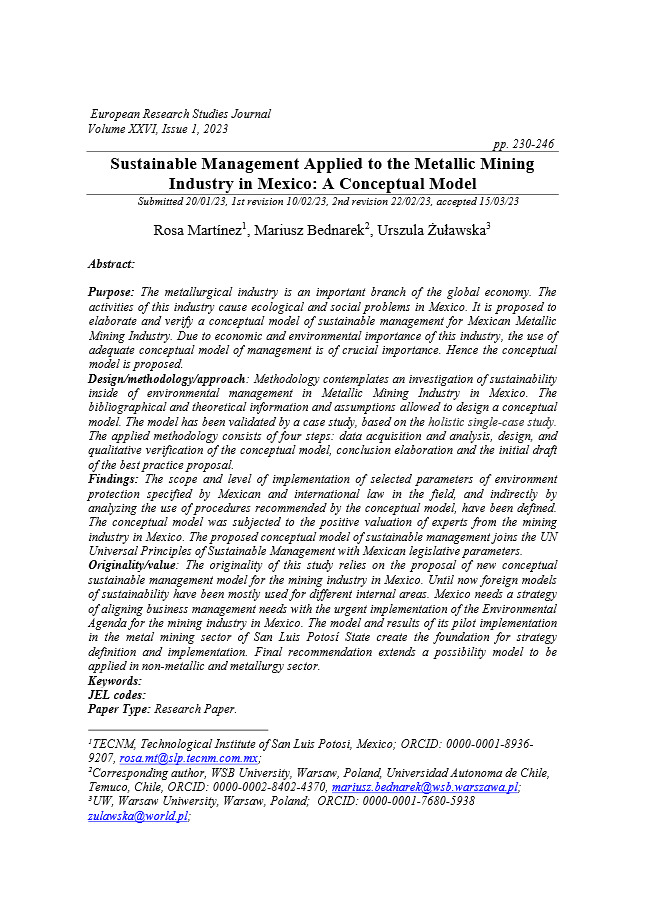
Sustainable Management Applied to the Metallic Mining Industry in Mexico: A Conceptual Model
The metallurgical industry is an important branch of the global economy. The activities of this industry cause ecological and social problems in Mexico. It is proposed to elaborate and verify a conceptual model of sustainable management for Mexican Metallic Mining Industry. Due to economic and environmental importance of this industry, the use of adequate conceptual model of management is of crucial importance. Hence the conceptual model is proposed.
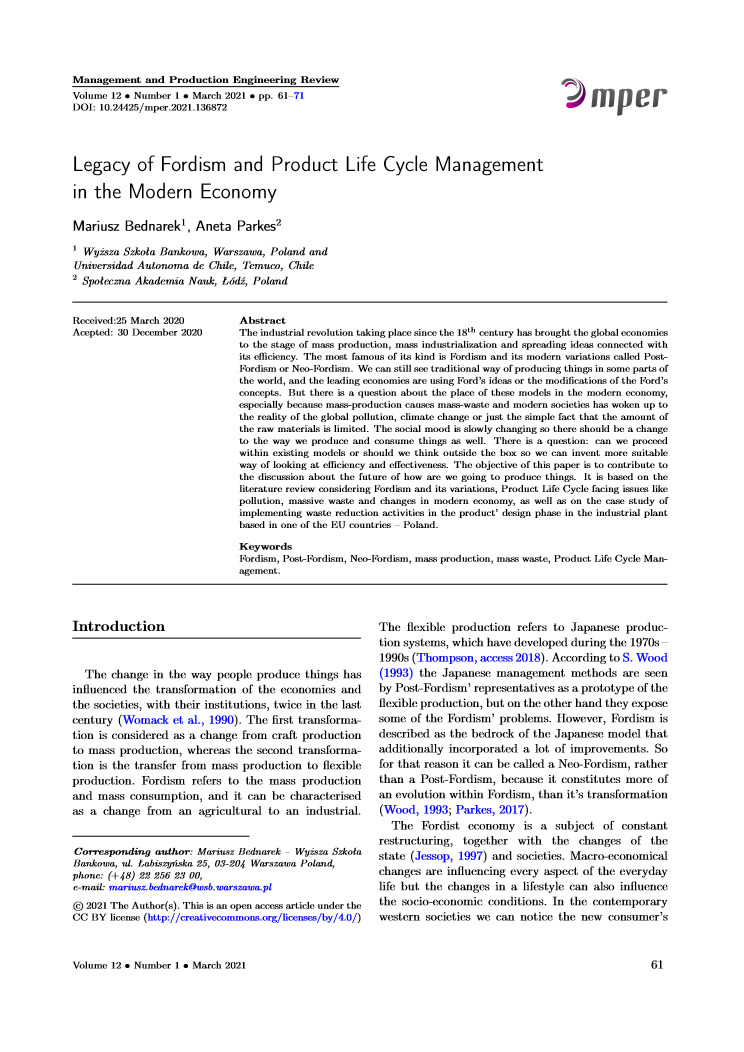
Legacy of Fordism and Product Life Cycle Management in the Modern Economy
The industrial revolution taking place since the 18th century has brought the global economies to the stage of mass production, mass industrialization and spreading ideas connected with its efficiency. The most famous of its kind is Fordism and its modern variations called Post- Fordism or Neo-Fordism. We can still see traditional way of producing things in some parts of the world, and the leading economies are using Ford’s ideas or the modifications of the Ford’s concepts. But there is a question about the place of these models in the modern economy, especially because mass-production causes mass-waste and modern societies has woken up to the reality of the global pollution, climate change or just the simple fact that the amount of the raw materials is limited. The social mood is slowly changing so there should be a change to the way we produce and consume things as well. There is a question: can we proceed within existing models or should we think outside the box so we can invent more suitable way of looking at efficiency and effectiveness. The objective of this paper is to contribute to the discussion about the future of how are we going to produce things. It is based on the literature review considering Fordism and its variations, Product Life Cycle facing issues like pollution, massive waste and changes in modern economy, as well as on the case study of implementing waste reduction activities in the product’ design phase in the industrial plant based in one of the EU countries – Poland.
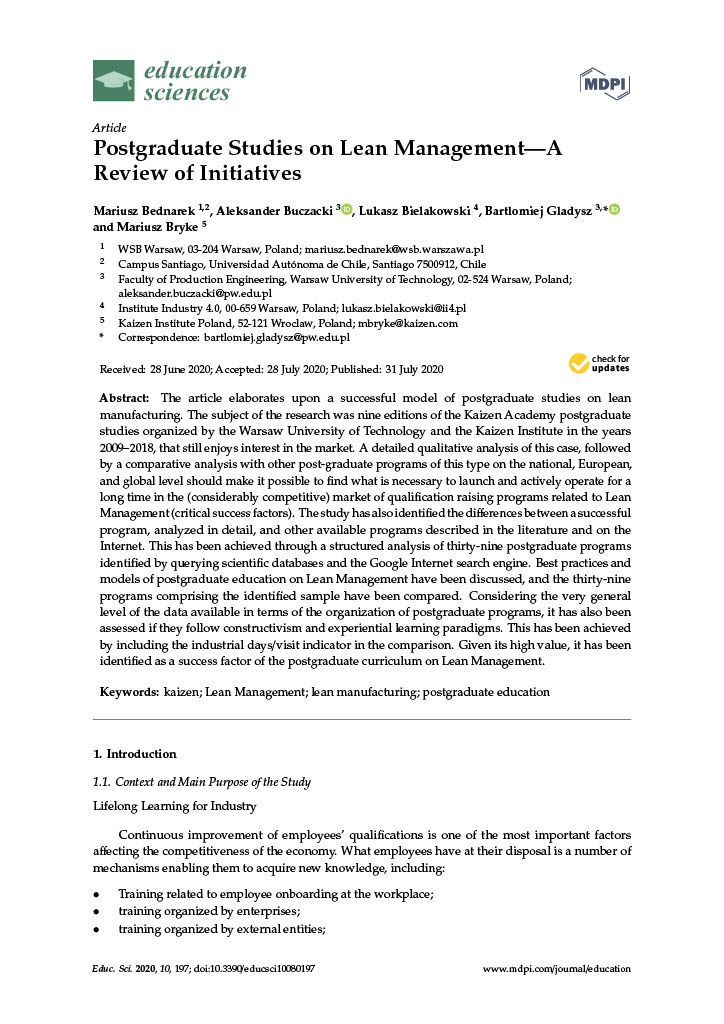
Postgraduate Studies on Lean Management — A Review of Initiatives
The article elaborates upon a successful model of postgraduate studies on lean manufacturing. The subject of the research was nine editions of the Kaizen Academy postgraduate studies organized by the Warsaw University of Technology and the Kaizen Institute in the years 2009–2018, that still enjoys interest in the market. A detailed qualitative analysis of this case, followedby a comparative analysis with other post-graduate programs of this type on the national, European, and global level should make it possible to find what is necessary to launch and actively operate for a long time in the (considerably competitive) market of qualification raising programs related to Lean Management (critical success factors). The study has also identified the di erences between a successful program, analyzed in detail, and other available programs described in the literature and on the Internet. This has been achieved through a structured analysis of thirty-nine postgraduate programs identified by querying scientific databases and the Google Internet search engine. Best practices and models of postgraduate education on Lean Management have been discussed, and the thirty-nine programs comprising the identified sample have been compared. Considering the very general level of the data available in terms of the organization of postgraduate programs, it has also been assessed if they follow constructivism and experiential learning paradigms. This has been achieved by including the industrial days/visit indicator in the comparison. Given its high value, it has been identified as a success factor of the postgraduate curriculum on Lean Management.

Business Insider Polska: Artificial intelligence, big data, machine learning and IoT
Nell Przybylska, Business Insider Polska: Artificial intelligence, big data, machine learning and IoT are no longer just a trend or temporary fashion, but a necessity. Do Polish companies have the chance to become technological leaders by implementing the idea of Industry 4.0?
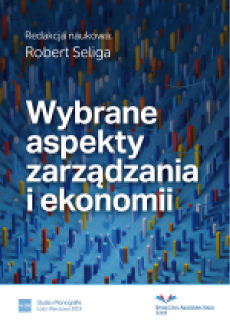
Selected problems of the Industry 4.0 implementation in automotive SMEs in Poland
The idea of the fourth industrial revolution was officially announced for the first time in 2011 in Hanover. It is a program of strategic reindustrialization of Europe, representing a response to the phenomenon of production migration to countries offering lower production costs. It is based on an assumption of continuous optimization of the way in which businesses function based on mutual real-time communication via cyber-physical systems, thanks to which analytical and decision-making tasks can be performed by both people and IT systems. It all boils down to abandoning the evolutionary optimization or upgrading of the former operating model by shifting toward seeking innovative areas of new activity. This entails changes to the current model of functioning of businesses, and concerns both the sphere of the technologies in use as well as management in the broad understanding of this notion. According to J. A. Schumpeter’s theory of creative destruction1, in order to grow, businesses must be ready for some drastic and fundamental changes, partially ruining the foundations of their former success, while their openness to innovation is prerequisite for survival and further development.
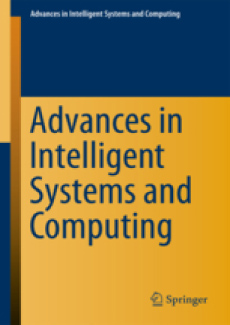
Practical verification of a logistic Lean model for small enterprises operating in Poland
The paper presents a Lean model designed for purposes of internal logistic and transport processes and elaborates upon its influence on the effectiveness of these processes. The paper also discusses results and conclusions of practical model verification using the Siemens Plant Simulation software. The final section provides recommendations for further actions and describes the key problems arising from the model implementation. The study has been limited to a single small-size plant, representative of the Polish metal-mechanical sector of industry, as well as to results of verification of the proposed Lean model by computer simulation without its practical implementation at any production line. The Lean model implementation has been limited to the internal transport and logistics process for groups of similar parts. Verification of the Lean model elements has been limited by capabilities of the software used. Some of the model elements could only be verified through their actual application under production conditions. A description of methodology for implementation of the Lean model that could be adapted to requirements of other companies representing the Polish metal-mechanical industry.
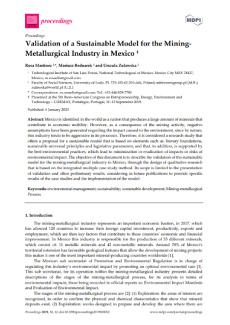
Validation of a Sustainable Model for the Mining- Metallurgical Industry in Mexico
Mexico is identified in the world as a nation that produces a large amount of minerals that contribute to economic mobility. However, as a consequence of the mining activity, negative assumptions have been generated regarding the impact caused to the environment, since by nature, this industry tends to be aggressive in its processes. Therefore, it is considered a research study that offers a proposal for a sustainable model that is based on elements such as: literary foundations, sustainable universal principles and legislative parameters; and that, in addition, is supported by the best environmental practices, which lead to minimization or eradication of impacts or risks of environmental impact. The objective of this document is to describe the validation of the sustainable model for the mining-metallurgical industry in Mexico, through the design of qualitative research that is based on the integrated multiple case study method. Its scope is limited to the presentation of validation and other preliminary results, considering in future publications to provide specific results of the case studies and the implementation of the model.
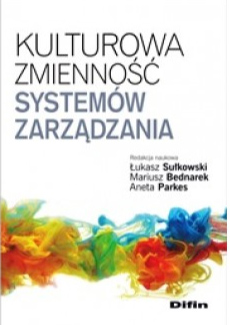
Kulturowa zmienność systemów zarządzania
Praca zbiorowa „Kulturowa zmienność systemów zarządzania” stanowi szósty tom w serii wydawniczej „Metody i techniki zarządzania” publikowanej w ramach działalności naukowej Wydziału Zarządzania Społecznej Akademii Nauk. Przesłaniem tej pracy jest próba analizy wybranych kulturowych i społecznych determinant systemów zarządzania. Na tle kierunków rozwoju współczesnych metod zarządzania przedsiębiorstwem przeprowadzona została analiza instrumentów przywództwa, kultury organizacyjnej oraz polityki personalnej. Rozważania zostały zilustrowane studiami przypadków podejmującymi problemy kulturowych determinant systemów zarządzania.
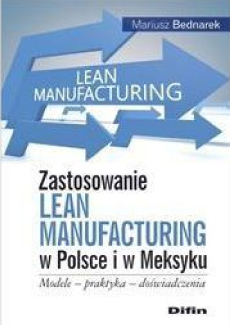
Zastosowanie Lean Manufacturing w Polsce i w Meksyku. Modele, praktyka, doświadczenia.
Materiał zawarty w książce jest adresowany do menadżerów wysokich i średnich szczebli zarządzania firm produkcyjnych różnych branż przemysłowych, a także studentów szkół wyższych, jako podręcznik do przedmiotów związanych z organizacją, zarządzaniem oraz inżynierią produkcji. Z książki dowiemy się m.in.: o formach organizacji współczesnych przedsiębiorstw, o przedsiębiorstwach Lean w Polsce i Meksyku, o modelach wdrażania Lean, o metodach i narzędziach używanych we wdrażaniu, o wynikach i przebiegu programów wdrożeniowych Lean, o zleceniach, które podnieść powinny efektywność wdrażania.
